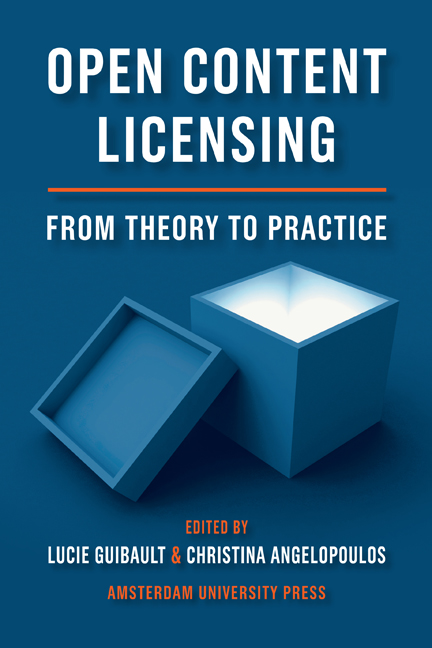Book contents
- Frontmatter
- Contents
- 1 Open Content Licensing: From Theory to Practice – An Introduction
- 2 Towards a New Social Contract: Free-Licensing into the Knowledge Commons
- 3 Is Open Content a Victim of its Own Success? Some Economic Thoughts on the Standardization of Licenses
- 4 (Re)introducing Formalities in Copyright as a Strategy for the Public Domain
- 5 User-Related Assets and Drawbacks of Open Content Licensing
- 6 Owning the Right to Open Up Access to Scientific Publications
- 7 Friends or Foes? Creative Commons, Freedom of Information Law and the European Union Framework for Reuse of Public Sector Information
- 8 Contributing to Conversational Copyright: Creative Commons Licenses and Cultural Heritage Institutions
- 9 Creative Commons and Related Rights in Sound Recordings: Are the Two Systems Compatible?
9 - Creative Commons and Related Rights in Sound Recordings: Are the Two Systems Compatible?
Published online by Cambridge University Press: 22 January 2021
- Frontmatter
- Contents
- 1 Open Content Licensing: From Theory to Practice – An Introduction
- 2 Towards a New Social Contract: Free-Licensing into the Knowledge Commons
- 3 Is Open Content a Victim of its Own Success? Some Economic Thoughts on the Standardization of Licenses
- 4 (Re)introducing Formalities in Copyright as a Strategy for the Public Domain
- 5 User-Related Assets and Drawbacks of Open Content Licensing
- 6 Owning the Right to Open Up Access to Scientific Publications
- 7 Friends or Foes? Creative Commons, Freedom of Information Law and the European Union Framework for Reuse of Public Sector Information
- 8 Contributing to Conversational Copyright: Creative Commons Licenses and Cultural Heritage Institutions
- 9 Creative Commons and Related Rights in Sound Recordings: Are the Two Systems Compatible?
Summary
Introduction
Modern technologies have made the dissemination of creative works over the internet child's play, while technological advancements have changed the face of even traditional methods of circulation. A multitude of innovative media, formats and infrastructure provide users with new ways of accessing cultural products, something which is especially evident in the field of musical works. Today, music surrounds us and accompanies us into bars and restaurants as we unwind with friends, on the car radio as we head off to work or emanating from our computer's loudspeakers, either unexpectedly when we click into a website or according to our express intention when we tune into internet radio services. We even have the technical possibility of downloading and streaming specific tracks at a time and place of our liking, through recipient-initiated media or creating our own musical works and sharing them with others online. Yet even these modern technologies are not outside the reach of copyright law; the constraints copyright imposes apply even to the works of authors who wish to take advantage of modern technologies in order to achieve a broad and free dissemination of their work.
In response to the consequent demand for more freedom in the sharing of creative content, open content licenses began to emerge at the beginning of the twenty-first century. The term refers to so-called ‘some rights reserved’ licenses, which enable the owners of rights in creative content to grant certain freedoms over their works, allowing others to access, distribute or even modify them. Today the most well-known set of open access licenses is the one developed by Creative Commons (CC). For a variety of different reasons, the attachment of Creative Commons licenses to creative works may not always go smoothly, however. In the specific case of musical works, a particularly thick parcel of varying intellectual property rights adds complexity to their release under the terms of a Creative Commons license: besides the author's exclusive economic and moral rights that may subsist in the music or lyrics themselves, the performance of the music or lyrics and the phonogram onto which this performance has been fixated will also be the subject of so-called neighbouring or related rights.
- Type
- Chapter
- Information
- Open Content LicensingFrom Theory to Practice, pp. 243 - 295Publisher: Amsterdam University PressPrint publication year: 2012



